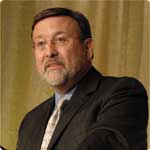
Community Services Provide Safety Net for Returning Veterans
By Rebecca A. Clay

Sgt. Aundrey
Sanchez |

Antonette
Zeiss, Ph.D. |

Richard
Steinberg, M.Ed. |
When Sgt. Aundrey Sanchez tells the story of his time
in Iraq, he uses certain words repeatedly: words like
"pride," "patriotism," and "excitement,"
but also words like "fear," "sadness,"
and "shock." When the Army mechanic returned
home to South Carolina, his wife told him he had become
more aggressive and quick to anger.
"Those are changes I had to accept," said
Sgt. Sanchez, who now works at an insurance company.
"It was no easy transition."
Sgt. Sanchez' successful reintegration back into civilian
life makes him one of the lucky ones. Some of the soldiers
returning home from Iraq and Afghanistan aren't so fortunate.
For them, the rigors of warfare have led to post-traumatic
stress disorder (PTSD) and other psychological problems,
substance abuse, even suicide.
To help repay that debt, SAMHSA sponsored a 3-day conference
in partnership with Therapeutic Communities of America
(TCA) in Washington, DC, in March. "The Road Home:
The National Behavioral Health Conference on Returning
Veterans and Their Families" brought together more
than 1,000 community mental health and substance abuse
treatment providers to discuss evidence-based strategies
for restoring hope and building resiliency in veterans,
active-duty service members, reservists, National Guard
members, and their families.
"The
duties of today's soldiers can leave
footprints on their psyches. . . . We owe
veterans more than gratitude."
—Charles G.
Curie
SAMHSA Administrator
|
|

|
| SAMHSA Administrator
Charles G. Curie, M.A., A.C.S.W. |
For TCA Executive Director Linda Hay Crawford, M.Ed.,
the conference was a way to help providers avoid the
mistakes of the past. "For many years after Vietnam,
we were seeing people too late in their addictions and
their PTSD," she said. "Now we want to catch
problems earlier and help families be part of the solution.
And communities have a definite role to play in welcoming
veterans home and helping families prevent behavioral
health issues."
Back to Top
A Different Kind of War
In any war, soldiers may witness death and destruction.
They may suffer injuries themselves. They may experience
relentless stress.
In Iraq and Afghanistan, however, additional factors
put soldiers at risk of substance abuse and mental health
problems. The lack of a front line, for example, means
that soldiers can face danger anywhere—even in
supposedly "safe" zones. And medical advances
now allow soldiers to survive catastrophic brain injuries,
spinal cord injuries, and wounds that would once have
been fatal.
Those fighting in Iraq and Afghanistan also differ from
those who fought previous wars. Today's military includes
an unprecedented number of women, for instance. And soldiers
are more likely than ever before to be National Guard
or reserve personnel, who may not be as prepared for
combat as regular troops. In fact, roughly half of the
150,000 troops in combat are National Guard members and
reservists, according to Richard Steinberg, M.Ed., Immediate
Past President of TCA and President and Chief Executive
Officer of WestCare.
Most returning veterans do just fine, emphasized H.
Westley Clark, M.D., J.D., M.P.H., Director of SAMHSA's
Center for Substance Abuse Treatment (CSAT). But for
some, war's psychological impact can be serious and long-lasting.
And most can benefit from support as they make the transition
back to civilian life. "During war, soldiers may
dream of returning home," said Dr. Clark. "When
they return, they often find that things aren't as ideal
as they remembered." In addition to problems with
money, marriages, child-rearing, jobs, housing, and the
like, veterans may feel alienated from family, friends,
and society.
Mental disorders are one of the top three conditions
that lead veterans to seek care from the U.S. Department
of Veterans Affairs (VA), explained Antonette Zeiss,
Ph.D., Deputy Chief Consultant in the Office of Mental
Health Services at the VA Central Office. Within that
category, PTSD is by far the most common diagnosis. Veterans
also come in complaining of depression, anxiety, mood
disorders, sexual dysfunction, and substance abuse.
Top photo illustration designed by
Martín Castillo. All other photos in this Special
Report by David Kasamatsu for SAMHSA.
See
Photo Gallery »
« See Also—Previous
Article
See Also—The Road Home: National Conference on Returning Veterans & Their Families
See Also—Article:
Part 2 »
Addressing Special Needs of Veterans »
Preventing Suicide among Veterans »
Recovery Month Includes Veterans »
Resources for Veterans »
See Also—Next
Article »
Back to Top
|

